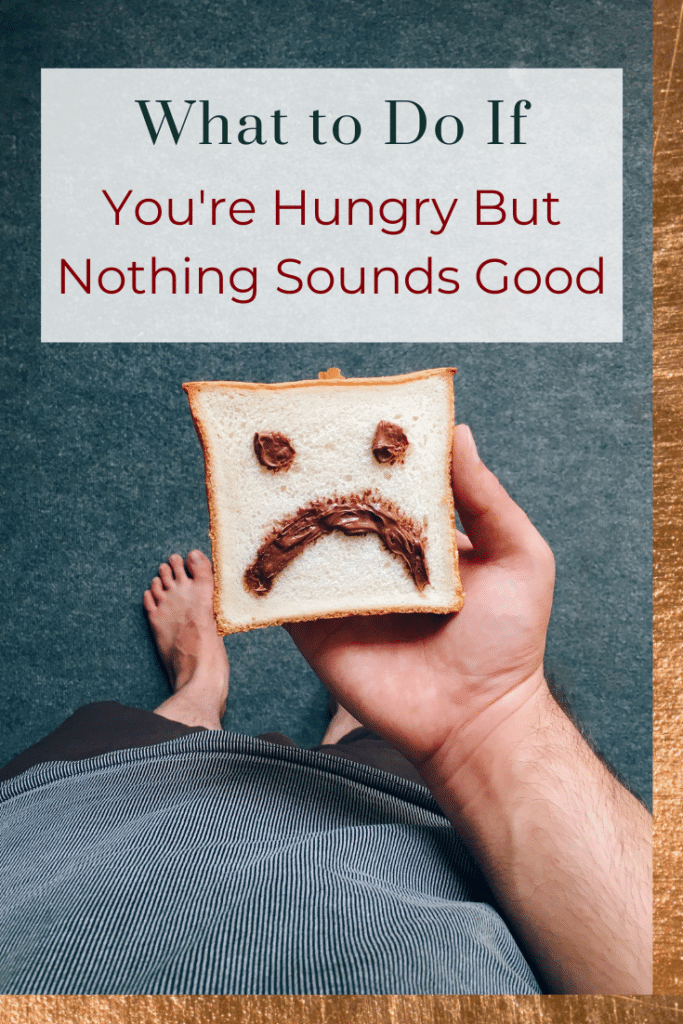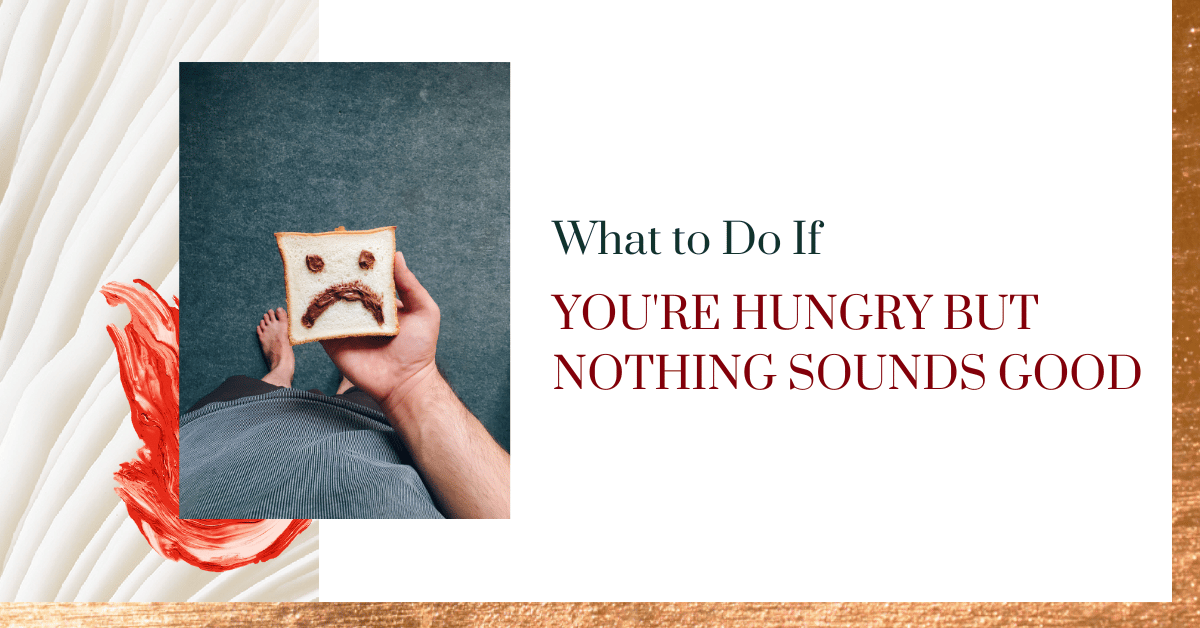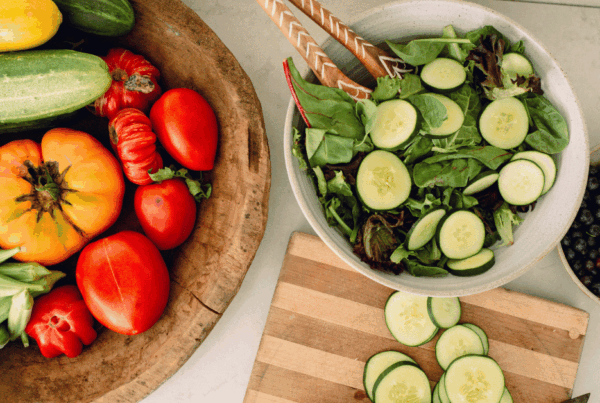Many things can impact your appetite and there are several reasons why you are hungry, but don’t feel like eating. Continue reading to learn more, plus 5 tips to try when you’re hungry but nothing sounds good.

Why does nothing sound good?
There are a few reasons why we can be hungry and still nothing sounds appealing enough to eat. Depending on the cause, different approaches might work better when you are hungry but do not feel like eating anything.
Physical hunger without mental hunger.
There are several kinds of hungerincluding physical hunger and mental hunger. Physical hunger is what most people typically think of when they think of hunger: an empty feeling and/or a stomach rumbling.
Mental hunger is a desire or craving for a certain food, flavor, or texture. Sometimes they both show up at the same time; at other points, you may experience one without the other. (Note: both types of hunger are valid and are a sign that you need to eat something, that your body needs food and energy.)
When you feel hungry but no food sounds good, you might be experiencing physical hunger without mental hunger. Your body is signaling that it is time to eat, but it is not telling you what specifically it wants to eat. This can make it challenging to figure out what to eat. (See the 5 tips below for some ideas on how to overcome this).
Food does not have power over you anymore.
Many people find that as they work on intuitive eating they crave foods less than before, and food feels less exciting. When you reconnect to your body signals and give yourself unconditional permission to eat, it begins to remove scarcity-driven food decisions.
When there are no longer “forbidden foods”, and everything is fair game to eat, food may seem less exciting or interesting. Some people find as they progress with intuitive eating that their food cravings decrease. This can be really freeing and liberating, but it can also make deciding what to eat more challenging.
Physical and mental health conditions
Stress, anxiety, and depression can all affect your appetite and make it harder to eat (even if you are physically hungry, and even though you still need to eat). So can certain physical conditions, like hypothyroidism or nausea related to morning sickness or other health conditions.
Many people will notice physical symptoms of hunger but still find it hard to eat. When this happens, it can be helpful to eat smaller, more frequent meals. Taking breaks during your work day, and incorporating other coping and stress reduction tools is also important. Continue reading for more ideas of what to do when food doesn’t sound appealing.
Medication changes.
Many medications can affect your appetite. Certain side effects such as fatigue, nausea, mood changes, or taste alterations can affect your hunger cues and how much you eat. If you have recently started a new medication, stopped a medication, or changed medication dosage, this could be impacting your appetite.
If you suspect a medication is affecting your ability and/or desire to eat, speak with your doctor or dietitian.
5 tips for when you’re hungry but nothing sounds good
1. Rely on your brain knowledge
As you (re)establish your relationship around food with your body, you can rely on two kinds of food and eating knowledge: body knowledge and brain knowledge. When you know you need to eat, but nothing sounds good, your body knowledge is telling you that it needs energy and sustenance, but it is not providing you with much guidance as to what to eat.
This is where your brain knowledge comes in. Think about, from past experiences, what makes a filling meal for you. What foods or meals are typically satisfying for you? What foods go down easy?
Eating something that includes a combination of carbohydrate, protein, and fat generally promotes feelings of fullness, as each nutrient works on our appetite receptors in different ways. As you experiment and build up more brain knowledge, you can rely on this to put together a meal that you know will provide the nutrients you need, even when nothing sounds good.
2. Rely on convenience
Sometimes when nothing sounds good enough to eat, it feels like nothing is worth the effort to prepare. This is where convenience foods come in handy. These can include anything like:
- Ready-to-eat meals
- Frozen foods
- Cereals
- Canned or boxed soup
- Toast
- Instant noodles
- Boxed mac and cheese
- Microwaveable rice
- Canned beans or bagged lentils
- Pasta and sauce
- Bottled smoothies and nutrition shakes
- Drinkable yogurt or kefir
When I’m physically hungry and know I need to eat, but no food sounds good, one of my go-to’s is boxed macaroni and cheese topped with frozen cooked peas. It’s quick, easy, filling, and it’s something I know I can eat even if nothing sounds good.
Many people find it’s easier to drink than eat when nothing is sounding good. There are a variety of nutrition drinks, shakes, and smoothies on the market now, as well as drinkable yogurts and kefir. This can be a simple way to get in some calories and nutrients, even if food is unappealing.
You can also rely on other factors to help you decide what to eat. Are there vegetables in the fridge that is wilting, or are there leftovers that are about to go bad? You can use these items as a base from which to build a quick meal for yourself.
3. Have a snack in the meantime
If you don’t feel like eating a full meal it’s okay to have a snack or a smaller meal. Sometimes, the reason you may feel like nothing sounds good is because a big meal feels overwhelming or too much work. Give yourself permission to have a snack or smaller meal, and then check in with your body to see how you’re feeling.
To ensure a filling snack, make sure your snack combines any two of the three macronutrients (carbohydrates, protein, and fat).
Check back in with yourself 1-2 hours after the snack. If you’re still hungry, is there anything that sounds appealing to you? Did the flavors and textures of the snack give your body an idea of what it wants (or doesn’t want) in the moment?
Sometimes, having a little food in our body puts us in a better mood, as it helps get us out of the lower end of the hunger-fullness scale. Once we’re feeling better, food may start to become more appealing too.
Note: if you’re struggling to eat enough at meals, this can be a sign of an eating disorder. Learn more about eating disorders and find support.
4. Make it fun
It is possible that nothing sounds good because you’re in a food rut and bored with your meal routine. Switch things up by making or grabbing different foods. If you typically have a salad or sandwich for lunch, try eating a hot meal. Meals don’t have to “look” a certain way: blend yourself a smoothie, or serve yourself a charcuterie board.
If you’re unsure where to start, I recommend going to the grocery store when you’re a little bit hungry. Instead of going for your typical foods, walk up and down every single aisle and notice what foods stand out to you.
Even if you stick to the same food, you can still jazz up the presentation by using a fun plate or bowl, setting the table with placemats, or lighting a candle. Any change from the typical routine can add a breath of fresh air to make food seem more exciting.
5. Eat with someone else
Humans are social creatures, and many people find that it’s easier to eat when they are with people than when they are alone. Eating with another person can help increase your appetite and help you enjoy the food more.
Eating with another person may also help you get out of a food rut, whether that’s through trying a new restaurant, or getting a new food suggestion that you hadn’t thought about.
When we eat with other people, generally the overall eating experience can be more pleasant than trying to squeeze in a meal we were not in the mood for. This can be a good opportunity to spend some quality time and catch up with a loved one as well.
Try calling up a friend or family member and making a meal date, then notice what impact it has on your eating.
Whatever you decide to do, remember to be gentle with yourself.
In general, if you’re struggling to eat consistently and enough throughout the day, any food is better than no food. Your body is worthy of nourishment, regardless of what is going on. If you need more support, I recommend working with a registered dietitian.
Do you have strategies you rely on when you’re hungry but nothing seems appealing? Please share below!
Looking for more support?
My team and I offer virtual one-on-one nutrition coachingsupporting people with intuitive eating, disordered eating and eating disorders, and more.
I also recommend my Unapologetic Eating 101 Coursean online, self-paced intuitive eating and body image program to help you liberate yourself from dieting and make peace with food and your body.
Author Bio
This blog post was written by Thanh Thanh Nguyen, a dietetic intern at Teachers College, Columbia University.
The post was reviewed and edited by Alissa Rumsey, MS, RD, CSCSa registered dietitian and Certified Intuitive Eating Counselor. She specializes in weight-inclusive care, intuitive eating, body image healing, mindfulness, self-compassion, and healing from chronic dieting, disordered eating, and eating disorders. Alissa holds a Bachelor’s Degree in Nutrition and Exercise Science, and a Master’s Degree in Health Communications, and is also an NSCA Certified Strength and Conditioning Specialist.
.
.
.
#Youre #Hungry #Sounds #Good
Source link








